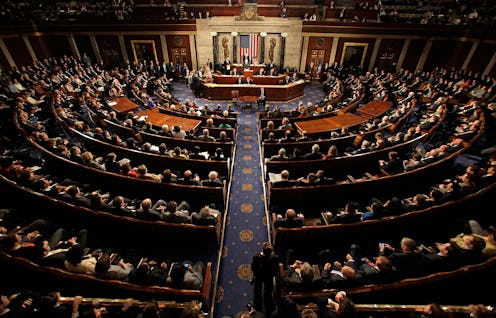Life
Here's How Much Faithless Electors Are Fined
Americans across the country are progressing from the "is this really happening?" to the "oh, god, this really is happening" stages of dealing with Tuesday night's election results, and as a result, there's been a sharp spike in interest in how much faithless electors are fined. The details of the Electoral College may have escaped you since you graduated high school, but since Trump became the president-elect of the United States, many have pointed to electors as a possible escape hatch from his presidency — albeit one that's unlikely.
If you've only recently resurfaced from screaming into a pillow for three days straight, here's the rundown on the results of the election: Hillary Clinton won the popular vote by a substantial margin, but Trump won more electoral votes. Traditionally, electors are supposed to vote for the candidate who won the popular vote in their state, no matter how close the race turned out to be, and that's almost exclusively what happens. According to FairVote.org, there have only been 157 so-called "faithless electors" — that is, electors who don't vote for their party's designated candidate — since the creation of the Electoral College.
There's no federal law requiring electors to vote with their states, although it's heavily discouraged. In 26 states and the District of Columbia, faithless electors do receive a punishment, but it's typically with a fine or misdemeanor charge. The exact amount depends on the state, but it's usually between $500 and $1,000 — not exactly an insurmountable cost. You can read up on the specifics of each state's punishment for faithless electors at the National Archives and Records Administration website.
Since it became clear that Clinton won the popular vote, in a result reminiscent of the controversial 2000 election, some are urging members of the Electoral College to ignore the results of the polls in their state and cast their vote for Clinton on Dec. 19. It might sound far-fetched, but a Change.org petition asking electors to vote for Clinton has received more than 2.6 million signatures in just two days. Protests have also flared up across the country, with thousands of high school students walking out and demonstrations taking place in at least 25 cities.
Unfortunately for Clinton supporters, faithless electors aren't likely to change the results of the election. According to the New York Times, Clinton received 233 electoral votes to Trump's 305, so a substantial number of Republican electors would have to switch their votes on Dec. 19.
And with that, we're back to the "oh, god, this really is happening" realization. This calls for a basket of puppies.
Image: Giphy
